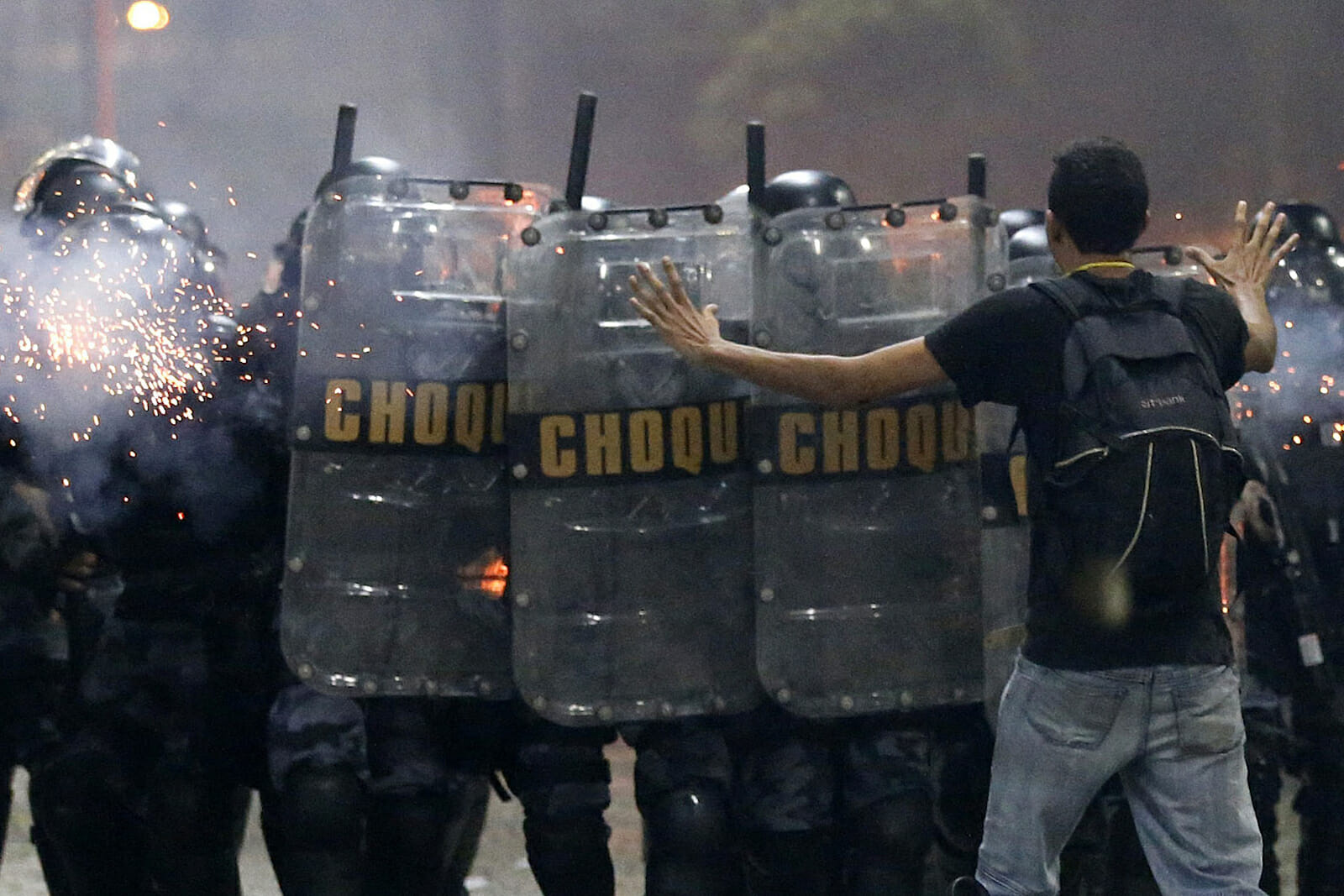
Brazil in Protest: To What End?
Brazilians have been protesting for the past two weeks. On June 2oth, over 1 million people in at least 80 cities took to the streets. There were around 110,000 protesters in São Paulo, 80,000 in Manaus, 50,000 in Recife and 20,000 in Belo Horizonte and Salvador. This is the largest protest movement that the country has witnessed since 1992 when Brazilians demanded the impeachment of President Fernando Collor de Mello. The mostly peaceful protests were sparked by a decision to increase public transportation fees by 20 cents in São Paulo.
The protests quickly spread to other cities. The protests are likely to bring a real change in the attitude of the Brazilian government, partly because they are occurring at a time when Brazil is preparing for new elections and is, therefore, more inclined to address any grievances.
The rallies are taking place simultaneously with the Confederations Cup tournament, which is as a warm-up to the World Cup, during which Brazil plays against a smaller group of national teams from around the world. The protests are being led by students and the middle class, who, like in Turkey and the Arab spring demonstrations, have used social media, particularly Facebook and Twitter, to spread the word of protest gatherings. Importantly, the middle class does not form the key part of Dilma Rousseff’s electoral base, which consists mainly of the poorest voters. Hundreds of people have been arrested, while many others have been injured since the police have used tear gas, pepper spray and rubber bullets to intimidate and disperse the protesters.
One of the immediate consequences of the demonstrations was that authorities in Rio de Janeiro and São Paulo reversed the public transportation fare increases. Nevertheless, Fernando Haddad, São Paulo’s mayor, emphasized that this decision would require a big cut in other investments, while Rio’s mayor, Eduardo Paes, emphasized that it would cost the city an estimated 500m reals/$225m a year.
These measures did not quell the protesters. In fact, the targets of the demonstrators broadened to include high taxes, the poor public services ranging from hospitals to schools, corruption as well as over $26 billion taken from public funds that will be spent on the 2014 World Cup and the 2016 Olympics. The protesters believe that the money spent on the stadiums should be spent on public services. Nevertheless, President Dilma Rousseff has denied that the costs associated with the World Cup would be covered with taxpayer money, stressing that next year’s tournaments will be financed by companies that would make use of the stadiums.
While, during the past decade, Brazil has become the 7th largest economy, introduced more employment opportunities, investments and economic growth, pulling over 30 million Brazilians out of poverty, offering them greater spending power and more security, many people are still making minimum wage, earning just $313 a month and struggling to cope with Brazil’s significant inflation rate.
The protests come at a critical time for Brazil. They are taking place less than a year before presidential and gubernatorial elections, as a signal that political parties must reconsider their strategies. After a decade of consistent economic growth, Brazil’s economy has been slowing down. In 2012, the figure for growth was 0.9 percent, while it was 7.5 percent in 2010. While Rousseff administration has driven down interest rates during the first years of her presidency, they might rise again in order to curb inflation. Brazilians fear a return of the hyperinflation that affected the country until the mid-1990s. Brazil’s economic slowdown is also driven by the poor economic performances of its main export partners, China, Germany, the Netherlands, and France.
Dilma Rousseff has responded to the protests with a firm, but the respectful reaction, in sharp contrast to Turkey’s prime minister, Recep Tayyip Erdoğan, who preferred to dismiss the relevance of the protests. Firstly, in response to the protests, Dilma Rousseff decided to cancel a trip to Japan. In contrast, Erdoğan, defying the on-going protests in his country, went on an official visit to Tunisia.
Secondly, as opposed to Erdoğan, Rousseff acknowledged the legitimacy and importance of the protesters’ demands. Thus, Rousseff praised the protesters’ active participation in democracy, assured them that their message was being heard and promised that her government was committed to social transformation. Rousseff has emphasized that the demonstrations strengthen Brazilian democracy. Moreover, Rousseff went one step further. On June 21st, Rousseff held an emergency meeting with key ministers to address some of the issues raised by the protesters. After the meeting, Rousseff announced that she wanted to engage in direct dialogue with some of the rallies’ leaders and that her government would create a national plan for public transportation.
Rousseff also emphasized that she was supporting a plan before Congress to invest all oil revenue royalties in education and that she wanted to ensure more transparency in institutions to prevent corruption. Nevertheless, the following day, hundreds of thousands continued to demonstrate in over 20 cities throughout Brazil.
Rousseff’s empathy with the protesters stems from her own involvement against Brazil’s former military regime from and the three years she spent in prison, being tortured. She emphasized, “My generation fought a lot so that the voice of the streets could be heard. Many were persecuted, tortured and many died for this. The voice of the street must be heard and respected and it can’t be confused with the noise and truculence of some troublemakers.”
The current protests, though large and unprecedented, are unlikely to lead to any resignations and a wholesale change in the government. This is not what the protesters seek. Just like in Turkey, a large part of the Brazilian population considers itself neglected by a government, which has for a long time been impressed by its own popularity. Even if the change was wanted, the main opposition party, the Social Democratic Party, is less popular than Rousseff’s Workers’ Party, and at least, at this point, there is no other viable alternative. The protests will likely act like a wake-up call for Brazil’s government to step up and put the legitimate needs of its population first.

